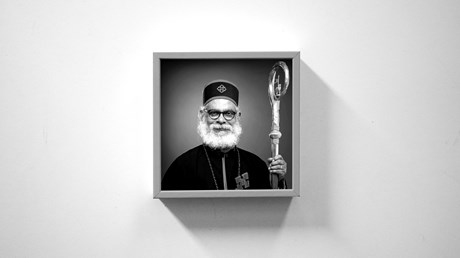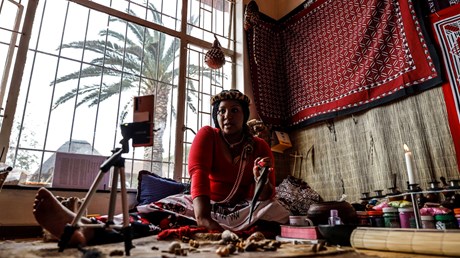Search Results for Indigenous
News
The champion of “native missions” trained more than 100,000 evangelists but got in trouble for financial mismanagement.
 Athanasius Yohannan, who built one of the world’s largest mission organizations on the idea that Western Christians should support “native missionaries” but got in trouble for financial irregularities and dishonest fundraising, died on May 8. He was 74 and got hit by a car while walking along the road near his ministry headquarters in Texas.Born Kadapilaril Punnoose Yohannan and known for most of his ministry as K. P., Yohannan founded Gospel for Asia in 1979. Over the next 45 years, the organization trained more than 100,000 people to preach the gospel and plant and pastor churches in India, Bangladesh, Nepal, Sri Lanka, and other places in Southeast Asia, according to a recent ministry report. Gospel for Asia raised as much as $93 million in a year and in 2005 reported it was supporting about 14,500 indigenous evangelists and pastors in same-culture and near-culture ministry. Christians in the US were asked to give $30 per month to support them.“If we evangelize the world’s lost billions … it will be through native missions,” Yohannan wrote for CT. “The native missionary is far more effective than the expatriate. The national already knows the language and is already part of the culture. In many instances, he or she can go places where outsiders cannot go.”Yohannan’s death was mourned by Gospel for Asia, the church that he started and served as metropolitan bishop, and prominent political leaders in India.“He will be remembered for his service to society and emphasis on improving the quality of life of the downtrodden,” Prime Minister Narendra Modi wrote on social media. “May his soul rest in peace.”Both the governor of Kerala and the ...Continue reading... Athanasius Yohannan, who built one of the world’s largest mission organizations on the idea that Western Christians should support “native missionaries” but got in trouble for financial irregularities and dishonest fundraising, died on May 8. He was 74 and got hit by a car while walking along the road near his ministry headquarters in Texas.Born Kadapilaril Punnoose Yohannan and known for most of his ministry as K. P., Yohannan founded Gospel for Asia in 1979. Over the next 45 years, the organization trained more than 100,000 people to preach the gospel and plant and pastor churches in India, Bangladesh, Nepal, Sri Lanka, and other places in Southeast Asia, according to a recent ministry report. Gospel for Asia raised as much as $93 million in a year and in 2005 reported it was supporting about 14,500 indigenous evangelists and pastors in same-culture and near-culture ministry. Christians in the US were asked to give $30 per month to support them.“If we evangelize the world’s lost billions … it will be through native missions,” Yohannan wrote for CT. “The native missionary is far more effective than the expatriate. The national already knows the language and is already part of the culture. In many instances, he or she can go places where outsiders cannot go.”Yohannan’s death was mourned by Gospel for Asia, the church that he started and served as metropolitan bishop, and prominent political leaders in India.“He will be remembered for his service to society and emphasis on improving the quality of life of the downtrodden,” Prime Minister Narendra Modi wrote on social media. “May his soul rest in peace.”Both the governor of Kerala and the ...Continue reading... |
It wasn't only because of missionaries from the West, says a Tongan Australian theologian.
 Christian overseas missionaries were more successful in Oceania—the region spanning the Pacific Islands, Australia, Papua New Guinea, and New Zealand—than anywhere else in the world.In particular, people in the Pacific Islands (which include Fiji, Papua New Guinea, Samoa, Vanuatu, Tonga, and more) were receptive to the gospel because “their ancestors’ strong beliefs in a divine presence and in the afterlife made them very open to Christian faith,” wrote Jacqueline Ryle, a contributor to the 2021 reference volume Christianity in Oceania. Tongan Australian theologian Katalina Tahaafe-Williams says her research reveals the same: The growth of Christianity in the region was not because of white Europeans but rather due to Indigenous missionaries who translated Christianity in a way that made sense to locals.Tahaafe-Williams, who lives in Sydney, served as the Indigenous coeditor for the book alongside prominent global Christianity scholars Kenneth R. Ross and Todd M. Johnson.“Our goal was to recruit Indigenous writers from all over the region to contribute to this volume,” she explained. “It was my task to connect with potential authors, theologians, leaders, and church members from the Pacific Islands … we were very committed to finding, however challenging it might be, authors who were part of that particular culture, thereby making the work very authentic.”CT Global books editor Geethanjali Tupps spoke with Tahaafe-Williams on why Christianity flourished in the Pacific Islands, how migration patterns have impacted the church, and why the region shouldn’t serve as the poster child for climate change issues.Continue reading... Christian overseas missionaries were more successful in Oceania—the region spanning the Pacific Islands, Australia, Papua New Guinea, and New Zealand—than anywhere else in the world.In particular, people in the Pacific Islands (which include Fiji, Papua New Guinea, Samoa, Vanuatu, Tonga, and more) were receptive to the gospel because “their ancestors’ strong beliefs in a divine presence and in the afterlife made them very open to Christian faith,” wrote Jacqueline Ryle, a contributor to the 2021 reference volume Christianity in Oceania. Tongan Australian theologian Katalina Tahaafe-Williams says her research reveals the same: The growth of Christianity in the region was not because of white Europeans but rather due to Indigenous missionaries who translated Christianity in a way that made sense to locals.Tahaafe-Williams, who lives in Sydney, served as the Indigenous coeditor for the book alongside prominent global Christianity scholars Kenneth R. Ross and Todd M. Johnson.“Our goal was to recruit Indigenous writers from all over the region to contribute to this volume,” she explained. “It was my task to connect with potential authors, theologians, leaders, and church members from the Pacific Islands … we were very committed to finding, however challenging it might be, authors who were part of that particular culture, thereby making the work very authentic.”CT Global books editor Geethanjali Tupps spoke with Tahaafe-Williams on why Christianity flourished in the Pacific Islands, how migration patterns have impacted the church, and why the region shouldn’t serve as the poster child for climate change issues.Continue reading... |
The champion of “native missions” trained more than 100,000 evangelists but got in trouble for financial mismanagement.
 Athanasius Yohannan, who built one of the world’s largest mission organizations on the idea that Western Christians should support “native missionaries” but got in trouble for financial irregularities and dishonest fundraising, died on May 8. He was 74 and got hit by a car while walking along the road near his ministry headquarters in Texas.Born Kadapilaril Punnoose Yohannan and known for most of his ministry as K. P., Yohannan founded Gospel for Asia in 1979. Over the next 45 years, the organization trained more than 100,000 people to preach the gospel and plant and pastor churches in India, Bangladesh, Nepal, Sri Lanka, and other places in Southeast Asia, according to a recent ministry report. Gospel for Asia raised as much as $93 million in a year and in 2005 reported it was supporting about 14,500 indigenous evangelists and pastors in same-culture and near-culture ministry. Christians in the US were asked to give $30 per month to support them.“If we evangelize the world’s lost billions … it will be through native missions,” Yohannan wrote for CT. “The native missionary is far more effective than the expatriate. The national already knows the language and is already part of the culture. In many instances, he or she can go places where outsiders cannot go.”Yohannan’s death was mourned by Gospel for Asia, the church that he started and served as metropolitan bishop, and prominent political leaders in India.“He will be remembered for his service to society and emphasis on improving the quality of life of the downtrodden,” Prime Minister Narendra Modi wrote on social media. “May his soul rest in peace.”Both the governor of Kerala and the ...Continue reading... Athanasius Yohannan, who built one of the world’s largest mission organizations on the idea that Western Christians should support “native missionaries” but got in trouble for financial irregularities and dishonest fundraising, died on May 8. He was 74 and got hit by a car while walking along the road near his ministry headquarters in Texas.Born Kadapilaril Punnoose Yohannan and known for most of his ministry as K. P., Yohannan founded Gospel for Asia in 1979. Over the next 45 years, the organization trained more than 100,000 people to preach the gospel and plant and pastor churches in India, Bangladesh, Nepal, Sri Lanka, and other places in Southeast Asia, according to a recent ministry report. Gospel for Asia raised as much as $93 million in a year and in 2005 reported it was supporting about 14,500 indigenous evangelists and pastors in same-culture and near-culture ministry. Christians in the US were asked to give $30 per month to support them.“If we evangelize the world’s lost billions … it will be through native missions,” Yohannan wrote for CT. “The native missionary is far more effective than the expatriate. The national already knows the language and is already part of the culture. In many instances, he or she can go places where outsiders cannot go.”Yohannan’s death was mourned by Gospel for Asia, the church that he started and served as metropolitan bishop, and prominent political leaders in India.“He will be remembered for his service to society and emphasis on improving the quality of life of the downtrodden,” Prime Minister Narendra Modi wrote on social media. “May his soul rest in peace.”Both the governor of Kerala and the ...Continue reading... |
The champion of “native missions” trained more than 100,000 evangelists but got in trouble for financial mismanagement.
 Athanasius Yohannan, who built one of the world’s largest mission organizations on the idea that Western Christians should support “native missionaries” but got in trouble for financial irregularities and dishonest fundraising, died on May 8. He was 74 and got hit by a car while walking along the road near his ministry headquarters in Texas.Born Kadapilaril Punnoose Yohannan and known for most of his ministry as K. P., Yohannan founded Gospel for Asia in 1979. Over the next 45 years, the organization trained more than 100,000 people to preach the gospel and plant and pastor churches in India, Bangladesh, Nepal, Sri Lanka, and other places in Southeast Asia, according to a recent ministry report. Gospel for Asia raised as much as $93 million in a year and in 2005 reported it was supporting about 14,500 indigenous evangelists and pastors in same-culture and near-culture ministry. Christians in the US were asked to give $30 per month to support them.“If we evangelize the world’s lost billions … it will be through native missions,” Yohannan wrote for CT. “The native missionary is far more effective than the expatriate. The national already knows the language and is already part of the culture. In many instances, he or she can go places where outsiders cannot go.”Yohannan’s death was mourned by Gospel for Asia, the church that he started and served as metropolitan bishop, and prominent political leaders in India.“He will be remembered for his service to society and emphasis on improving the quality of life of the downtrodden,” Prime Minister Narendra Modi wrote on social media. “May his soul rest in peace.”Both the governor of Kerala and the ...Continue reading... Athanasius Yohannan, who built one of the world’s largest mission organizations on the idea that Western Christians should support “native missionaries” but got in trouble for financial irregularities and dishonest fundraising, died on May 8. He was 74 and got hit by a car while walking along the road near his ministry headquarters in Texas.Born Kadapilaril Punnoose Yohannan and known for most of his ministry as K. P., Yohannan founded Gospel for Asia in 1979. Over the next 45 years, the organization trained more than 100,000 people to preach the gospel and plant and pastor churches in India, Bangladesh, Nepal, Sri Lanka, and other places in Southeast Asia, according to a recent ministry report. Gospel for Asia raised as much as $93 million in a year and in 2005 reported it was supporting about 14,500 indigenous evangelists and pastors in same-culture and near-culture ministry. Christians in the US were asked to give $30 per month to support them.“If we evangelize the world’s lost billions … it will be through native missions,” Yohannan wrote for CT. “The native missionary is far more effective than the expatriate. The national already knows the language and is already part of the culture. In many instances, he or she can go places where outsiders cannot go.”Yohannan’s death was mourned by Gospel for Asia, the church that he started and served as metropolitan bishop, and prominent political leaders in India.“He will be remembered for his service to society and emphasis on improving the quality of life of the downtrodden,” Prime Minister Narendra Modi wrote on social media. “May his soul rest in peace.”Both the governor of Kerala and the ...Continue reading... |
Churches are combating syncretism among millennials and Gen Z amid a rise of social media healers who call on ancestral spirits.
 Millions of Black South Africans seek guidance from sangomas, traditional healers or so-called witch doctors who use their spiritual gifts to connect with ancestors, prescribe herbs to heal illnesses, and throw dry bones to predict the future.It’s a centuries-old tradition that has continued in the majority-Christian country and has adapted for the internet age: A new breed of influencer sangomas are positioning themselves on social media as digital-entrepreneurial-spiritual seers.Church leaders across several major denominations in South Africa have long decried the practice as involving “evil, devilish, and unclean spirits.” But as the online sagomas draw in a mass audience of millennial Christians—a generation eager to “decolonize” their lives and reconnect to indigenous African roots—church leaders have new concerns around syncretism as well as internet scams.Condemnation of sangomas and African ancestral worship is the strongest cog uniting European-legacy churches like Anglicans, Baptists, and Catholics as well as African-initiated churches like the Zion Christian Church (ZCC), said Tendai Muchatuta, a cleric with the Apostolic of All Nations Church in Johannesburg.Both kinds of churches say the practice, despite its popularity, is not compatible with Christianity.The ZCC is the largest African-initiated church in Southern Africa, with about 12 million churchgoers, including some 9 million in South Africa. Bauleni Moloi, a ZCC pastor in Johannesburg, called sangomas “dubious agents of darkness out to sway Christians from the true focus on the gospel of the cross.”But younger Christians are more likely to disagree. Many millennial and Gen Z South Africans embrace ...Continue reading... Millions of Black South Africans seek guidance from sangomas, traditional healers or so-called witch doctors who use their spiritual gifts to connect with ancestors, prescribe herbs to heal illnesses, and throw dry bones to predict the future.It’s a centuries-old tradition that has continued in the majority-Christian country and has adapted for the internet age: A new breed of influencer sangomas are positioning themselves on social media as digital-entrepreneurial-spiritual seers.Church leaders across several major denominations in South Africa have long decried the practice as involving “evil, devilish, and unclean spirits.” But as the online sagomas draw in a mass audience of millennial Christians—a generation eager to “decolonize” their lives and reconnect to indigenous African roots—church leaders have new concerns around syncretism as well as internet scams.Condemnation of sangomas and African ancestral worship is the strongest cog uniting European-legacy churches like Anglicans, Baptists, and Catholics as well as African-initiated churches like the Zion Christian Church (ZCC), said Tendai Muchatuta, a cleric with the Apostolic of All Nations Church in Johannesburg.Both kinds of churches say the practice, despite its popularity, is not compatible with Christianity.The ZCC is the largest African-initiated church in Southern Africa, with about 12 million churchgoers, including some 9 million in South Africa. Bauleni Moloi, a ZCC pastor in Johannesburg, called sangomas “dubious agents of darkness out to sway Christians from the true focus on the gospel of the cross.”But younger Christians are more likely to disagree. Many millennial and Gen Z South Africans embrace ...Continue reading... |



 Links
Links  Articles
Articles  Blogs
Blogs  Videos
Videos  News
News  Colors
Colors 

 New links
New links

